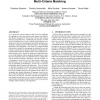Free Online Productivity Tools
i2Speak
i2Symbol
i2OCR
iTex2Img
iWeb2Print
iWeb2Shot
i2Type
iPdf2Split
iPdf2Merge
i2Bopomofo
i2Arabic
i2Style
i2Image
i2PDF
iLatex2Rtf
Sci2ools
139
click to vote
EDBT
2009
ACM
2009
ACM
Top-k dominant web services under multi-criteria matching
As we move from a Web of data to a Web of services, enhancing the capabilities of the current Web search engines with effective and efficient techniques for Web services retrieval and selection becomes an important issue. Traditionally, the relevance of a Web service advertisement to a service request is determined by computing an overall score that aggregates individual matching scores among the various parameters in their descriptions. Two drawbacks characterize such approaches. First, there is no single matching criterion that is optimal for determining the similarity between parameters. Instead, there are numerous approaches ranging from using Information Retrieval similarity metrics up to semantic logicbased inference rules. Second, the reduction of individual scores to an overall similarity leads to significant information loss. Since there is no consensus on how to weight these scores, existing methods are typically pessimistic, adopting a worst-case scenario. As a consequenc...
| Added | 19 May 2010 |
| Updated | 19 May 2010 |
| Type | Conference |
| Year | 2009 |
| Where | EDBT |
| Authors | Dimitrios Skoutas, Dimitris Sacharidis, Alkis Simitsis, Verena Kantere, Timos K. Sellis |
Comments (0)

